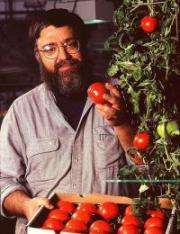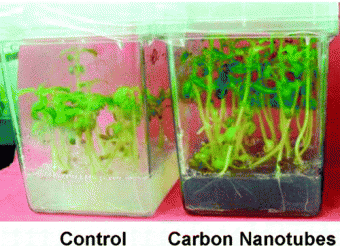Image credit: Jack Dykinga. These are tomatoes grown with the ACC synthase gene.
(PhysOrg.com) -- When we think of nanotubes, we often think of solar panels and physical science. However, it appears that nanotubes can also provide valuable help to plants as a fertilizer. Just add carbon nanotubes, say researchers at the University of Arkansas in Little Rock, and you can get plants that grow faster and bigger than their counterparts.
According to New Scientist, Mariya Khodakovskaya, a plant biologist, and Alexandru Biris, a nanotechnologist, used carbon nanotubes to encourage germination of tomato plants. Tomato seeds were planted, some with a growth medium containing carbon nanotubes, and some without nanotubes in the growth medium. It took only three days for more than 30% of the nanotube tomato seeds to begin sprouting. In that time, none of the non-treated seeds had even germinated.
In fact, it took 12 days for 32% of the tomato seeds without nanotube help to germinate.
Image: ACS Nano, DOI: 10.1021/nn900887m
After four weeks, the researchers noticed that the tomato plants that had been treated with carbon nanotubes had two times the biomass and two times the height of their non-treated counterparts. The current theory is that the nanotubes penetrate the seed coat of the tomato seeds, allowing water to more rapidly penetrate the seeds and boost their development.
Interestingly, the root systems were similar in all of the plants, so the nanotubes did not change the way the roots established themselves. Another issue is that the nanotubes seem to be causing abnormally long internodes, and that might affect the ultimate outcome regarding the viability of mature plants. Additionally, carbon nanotubes as fertilizer might present hazards when used for food plants, since they were found to trigger some toxic effects in mice.
In the end, though, it appears that carbon nanotubes may be more versatile than originally imagined.
More information: The research has been published in ACS Nano: Carbon Nanotubes Are Able To Penetrate Plant Seed Coat and Dramatically Affect Seed Germination and Plant Growth, DOI: 10.1021/nn900887m
© 2009 PhysOrg.com



















